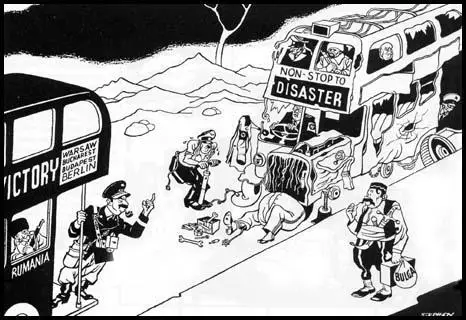Bulgaria
Bulgaria was a province of the Ottoman Empire from the 14th century until support from Russia enabled it to become an autonomous principality in 1878. Revolution in Turkey in 1908 undermined the power of Abdul Hamid II and enabled Bulgaria to become an independent kingdom under Prince Ferdinand.
Bulgaria's parliament was elected by manhood suffrage and had the power to veto royal legislation. The most powerful political group in parliament was the Nationalist Party. In 1913 Vasil Radoslavov became Bulgaria's prime minister.
Prince Ferdinand favoured an expansionist foreign policy and during the Balkan Wars joined with Serbia, Greece and Montenegro to drive Turkey out of Macedonia. In 1913 Prince Ferdinand launched an attack on its former allies. Bulgaria was defeated in six weeks and as a result lost Bulgarian-speaking parts of Macedonia and the coastal region of Dobrudja.
In 1910 the Bulgarian Army comprised some 85,000 troops in peacetime. All men aged between 20 and 46 could be called up during a war. After the Balkan Wars (1912-13) the size of the army was increased to ten divisions. Each division of 24,000 men were supported by cavalry squadrons, machine-gun troops and field artillery. With no major arms industry, the Bulgarian Army relied heavily on supplies of shells, bullets, artillery and machine guns from the German Army. The German Army Air Service also provided both personnel and aircraft.
In 1915 the Bulgarian government decided to join the Central Powers in the war with the Allies. Bulgarian troops were concentrated on the Balkan Front and took part in the invasion of Serbia in October 1915. They also protected the Thrace border against attack from Greece. The Bulgarian Army retreated during the Vardar Offensive and this continued until the Armistice was signed on 30th September, 1918.
About 1.2 million Bulgarians fought during the First World War. An estimated 100,000 were killed and some 160,000 wounded. After the war the Neuilly Treaty restricted the Bulgarian Army to 33,000 men.
In 1919 Alexander Stamboliyski, the leader of the Agrarian Union, gained power. He was murdered in 1923 and attempts were made by the communists to gain power. Political instability persisted until a dictatorship under Boris III was established. The new king cooperated with Nazi Germany and in March 1941 Bulgaria joined the Axis. Later that year the Bulgarian Army joined the German Army in occupying Yugoslavia.
In September 1944 the Red Army invaded Bulgaria and after defeating Bulgarian troops established a predominately Communist government under the leadership of Georgi Dimitrov.

